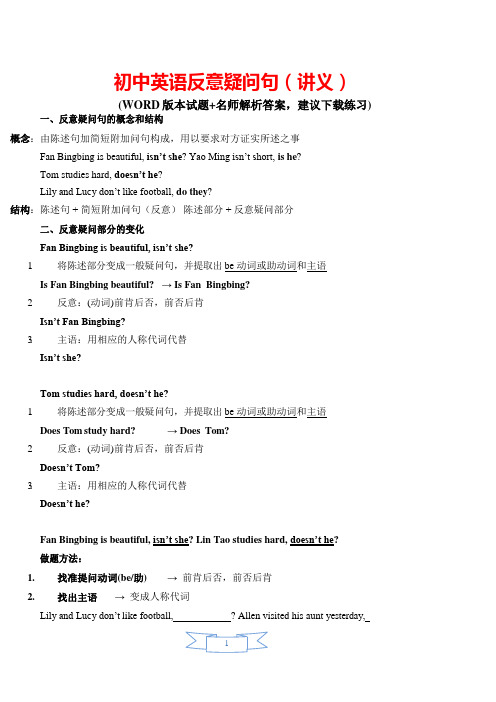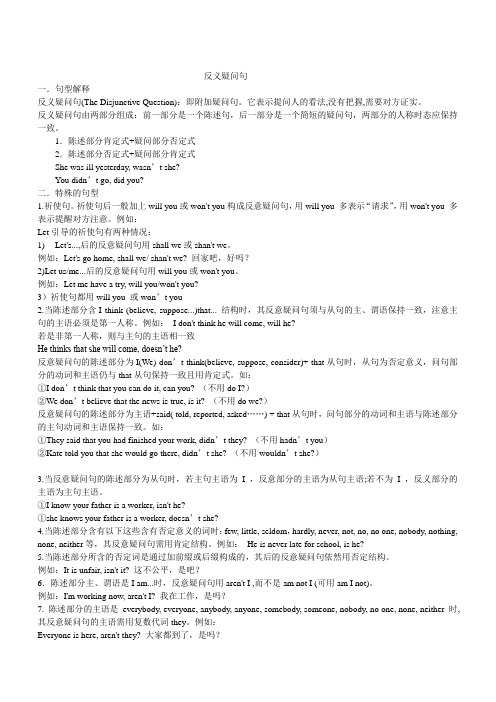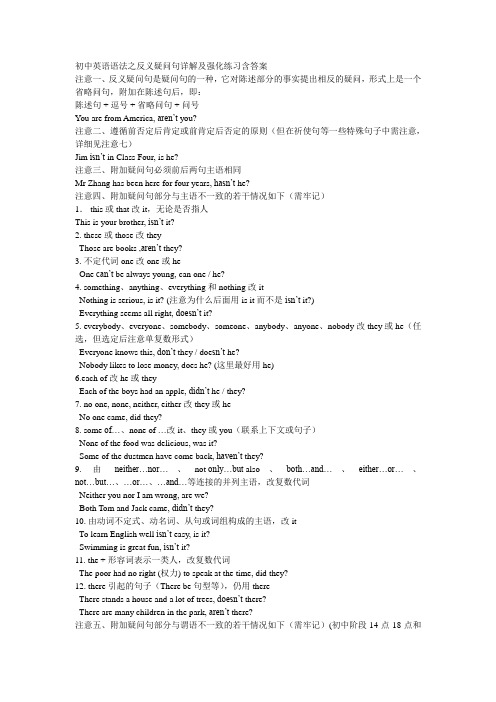初中英语 苏州中考复习专题--反义疑问句(讲解带练习)
初中反意疑问句讲解及练习附答案

初中反意疑问句讲解及练习附答案反义疑问句一、英文中的反意疑问句。
1、什么是反意疑问句英语中,反意疑问句是由陈述句和附在其后的附加疑问句组成。
其中附加疑问句是对陈述句所说的事实或观点提出疑问,起证实作用,一般用于证实说话者所说的事实或观点。
翻译为“是吗”2.反意疑问句的回答,回答时,如果情况属实,用Yes加上反问句的倒装肯定句;若果情况不属实,则用No加上反问句的倒装否定句。
例如You were moved by your students, weren’t you? 情况属实:Yes, I were. 情况不属实:No, I weren’t.3、反意疑问句中问句部分的动词与陈述部分的动词在语气上成相反的对应关系,即:肯定+否定?否定+肯定?如:① You can’t do it, can you? 你不能做它,是吗?②They are very late for the meeting, aren’t they? 他们开会迟到了,是吗?4、当陈述句中含有be动词,助动词,或是情态动词时,反问句部分由这些词加上主语人称代词构成,Be动词包括:am, is, are, was, were助动词有:do, does, did, have(用在完成时), has(用在完成时)等情态动词有:can, could, may, might, must, will, would, shall, should例如:She is a lovely girl, isn’t she? 她是一个可爱的女孩,是吗?He will go home, __won’t__ __he__? 他要回家了,是吗?She doesn’t like to eat popcorn, __does__ _she___? 她不喜欢吃爆米花,是吗?The baby won’t sleep early, will it? 小宝宝睡得不早,是吗?注意:①He has supper at home every day, doesn’t’t he?(不能用hasn’t he?)他每天在家吃晚饭,是吗?② They have known the matter, haven’t they? (不能用don’t they?)他们已经知道那事情了,是吗?5、当陈述句中只含有行为动词时,若动词加了s,就用does, 若动词为原形,就用do,动词为过去式,则用did,例如:You cleaned your house last week, _didn’t___ __you__? 你上周打扫了你的房间,是吗?Your father plays the computer very well, __doesn’t__ ___he _? 你父亲电脑技术很好,是吗?They look so happy today, _don’t ___ _they___? 你今天看起来很高兴,是吗?6、反意疑问句的陈述部分带有little, few, never, hardly, seldom,nobody, nothing,barely, scarcely等否定意义的词时,问句部分用肯定式。
初中反义疑问句详解及练习和答案

初中反义疑问句详解及练习和答案反义疑问句即附加疑问句。
它表示提问人的看法,没有把握,需要对方证实。
它表示提问人的看法,没有把握,需要对方证实。
反义疑问句由两部分组成:前一部分是一个陈述句,后一部分是一个简短的疑问句,两部分的人称时态应保持一致。
1.陈述部分肯定式+ 疑问部分否定式2.陈述部分否定式+ 疑问部分肯定式They work hare, don ' t they?She was ill yesterday, wasn ' t she?You didn ' t go, did you?He can ' t ride aikbe, can he? 请注意以下句型的反义疑问句的用法:1当陈述部分的主语是I,而句子又用来征询对方的意见时,附加疑问句中的主语用you。
如:I find English very interesting, don 't you?I don 't like that film, do you?2. 当陈述部分的主语是everybody, every one, some one, no body, no one, somebody 等合成代词时,附加疑问句中的主语通常用they。
但亦可用he,尤其是nobody, no one 等作主语,具有否定概念时。
如:Somebody phoned while I was out, didn 't they?Nobody wants to go there, does he?3. 当陈述部分的主语是不定代词e verything, nothing, anything, something 时,附加疑问句中的主语一般用it,不用they。
如:Everything seems all right now, doesn 't it?Nothing is kept in good order, is it?Something must be done to stop pollution, isn 't it?4. 当陈述部分的主语是指示代词this, that 或these, those 时,附加疑问句中的主语分别用it和they。
初中英语-苏州中考复习专题--反义疑问句(讲解带练习)

初中英语-苏州中考复习专题--反义疑问句(讲解带练习)-CAL-FENGHAI-(2020YEAR-YICAI)_JINGBIAN反意疑问句反意疑问句又叫附加疑问句,它表示提问人的看法,没有把握,需要对方证实。
主要有两部分组成:陈述部分+疑问部分。
两部分的人称时态应保持一致。
陈述部分和疑问部分要么前肯后否,要么前否后肯。
主要有两种类型:① 陈述部分(肯定)+疑问部分(否定)② 陈述部分(否定)+疑问部分(肯定)eg: It’s cold today, isn’t it 今天天气冷,不是吗eg:He doesn’t like it, does he 他不喜欢,是吗少数情况:祈使句部分(肯定)+疑问部分(肯定)eg:Let us go, will you 让我们去吧,好吗Let’s go,shall we1 主语(1)一般词语附加疑问句中主语用和主句一致的主语,用主格。
附加疑问句随从句。
注:陈述部分的主语是I,疑问部分要用 aren't I。
eg: I'm as tall as your sister,aren't I?(2)不定代词当陈述部分的主语是one时,后面的疑问句可用one/he.no one时,后面附加疑问句中主语用they。
Everything,anything, nothing, something时,附加疑问句中主语用it 不用they。
this,that,或those, these时,附加疑问句中主语用it或they.everyone,everybody,someone,somebody,anyone,nobody等时,附加疑问句中主语一般用they(口头语,非正式文体)/he(正式文体)。
不定式时,动名词,其他短语,附加疑问句中主语一般用it。
there be句型时,附加疑问句中一般用be/情态动词/助动词+there。
陈述部分有You'd like to +v. 疑问部分用wouldn't +主语。
初中反义疑问句讲解+专题练习

反意疑问句专题(中考必考1’)一、基本用法与结构反意疑问句由“陈述句+简略疑问句”两部分组成,第一部分提出一种看法,第二部分用来质疑或表示证实。
陈述部分与疑问部分的动词时态和动词性质应保持一致,而且肯定和否定形式彼此相反,即陈述部分为肯定式时,疑问部分用否定式,陈述部分为否定式时,疑问部分用肯定式:He likes English, doesn’t he? 他喜欢英语,是吗?He doesn’t like English, does he? 他不喜欢英语,是吗?【注】1. 若陈述部分含有hardly, never, few, nothing ,little,nobody,seldom等否定词或半否定词,其疑问部分要用肯定式:He has few friends here, has he? 他在这儿几乎没什么朋友,是吗?She said nothing, did she? 她什么也没说,是不是?2. 若陈述部分含有带否定前缀的词,疑问部分仍用否定式:It is unfair, isn’t it? 这不公平,不是吗?It is impossible, isn’t it? 那是不可能的,是吗?3. 当陈述部分为为there be句型时,疑问部分仍用there作“主语”:There was nothing in the room, was there? 房间里什么也没有,是吗?4. 当陈述部分的主语是指示代词(this ,that ,these ,those)时,疑问部分用it, t hey等代词:That is a new car, isn’t it? 这是一辆新汽车,是吗?5.当陈述部分的主语是复合不定代词时,若陈述部分的主语为somebody, someone, everyone, everybody, no one, nobody等复合不定代词,其反意疑问句的主语在正式文体中用he,在口语或非正式文体中通常用they:Nobody was late, were they? 没有一个人迟到,是吗?6.当陈述部分的主语是something, anything, nothing, everything等复合不定代词时,其反意疑问句的主语要用it:Everything is ready, isn’t it? 一切都准备好了吗?Nothing is important, is it? 没有什么重要的,不是吗?二、含情态动词的反意疑问句1. 基本原则:在通常情况下,当陈述部分含有情态动词时,疑问部分会重复前面同样的情态动词:He can speak English, can’t he?他会说英语,是吗?We shouldn’t go, should we? 我们不应该去,对不对?2. 当陈述部分含有must时,要分两种情况:①若must表示“必须”或“有必要”,疑问部分用mustn’t 或needn’t:You must leave at once, mustn’t [needn’t] you? 你必须(有必要)马上离开,是吗? 但是若陈述部分有mustn’t表示禁止,疑问部分要must:You mustn’t laugh, must you? 你不准笑,知道吗?②若must表示推测,疑问部分不能用must,而应根据must后的动词结构采用相应的动词形式:He must be tired,isn’t he? 他一定累了,是吗?三、陈述部分为祈使句的反意疑问句1. 基本原则:若陈述部分为祈使句,疑问部分通常用will you:Please help us, wil l you? 请帮帮我们,好吗?Come with us, will you? 同我们一起去,好吗?Don’t forget to post the letter, will you? 请别忘了寄信。
初中英语反意疑问句语法知识点(讲义及答案)

初中英语反意疑问句(讲义)(WORD版本试题+名师解析答案,建议下载练习)一、反意疑问句的概念和结构概念:由陈述句加简短附加问句构成,用以要求对方证实所述之事Fan Bingbing is beautiful, isn’t she? Yao Ming isn’t short, is he?Tom studies hard, doesn’t he?Lily and Lucy don’t like football, do they?结构:陈述句 + 简短附加问句(反意)陈述部分 + 反意疑问部分二、反意疑问部分的变化Fan Bingbing is beautiful, isn’t she?1.将陈述部分变成一般疑问句,并提取出 be 动词或助动词和主语Is Fan Bingbing beautiful? → Is Fan Bingbing?2.反意:(动词)前肯后否,前否后肯Isn’t Fan Bingbing?3.主语:用相应的人称代词代替Isn’t she?Tom studies hard, doesn’t he?1.将陈述部分变成一般疑问句,并提取出 be 动词或助动词和主语Does Tom study hard? → Does Tom?2.反意:(动词)前肯后否,前否后肯Doesn’t Tom?3.主语:用相应的人称代词代替Doesn’t he?Fan Bingbing is beautiful, isn’t she? Lin Tao studies hard, doesn’t he?做题方法:1.找准提问动词(be/助) →前肯后否,前否后肯2.找出主语→变成人称代词Lily and Lucy don’t like football, ? Allen visited his aunt yesterday,The children are playing over there, ? Jim can come here tomorrow, ?You have to finish your homework, ? Mary has chicken for lunch, ?练习:1.The twins were happy, ?2.Jim goes to school on foot, ?3.Peter and Allan played basketball yesterday, ?4.He can answer that question, ?5.She doesn’t have to go there so early, ?6.Tom can’t speak Chinese, ?7.Lily didn’t find her bike, ?8.Jane has to be quiet in the library, _?9.The Greens are watching TV now, ?10.The boy had a nice watch, ?三、反意疑问句的回答不论问题的提法如何,回答要根据事实来回答。
(完整版)反义疑问句详细讲解及习题及答案

反义疑问句一.句型解释反义疑问句(The Disjunctive Question):即附加疑问句。
它表示提问人的看法,没有把握,需要对方证实。
反义疑问句由两部分组成:前一部分是一个陈述句,后一部分是一个简短的疑问句,两部分的人称时态应保持一致。
1.陈述部分肯定式+疑问部分否定式2.陈述部分否定式+疑问部分肯定式She was ill yesterday, wasn’t she?You didn’t go, did you?二.特殊的句型1.祈使句。
祈使句后一般加上will you或won't you构成反意疑问句,用will you 多表示“请求”,用won't you 多表示提醒对方注意。
例如:Let引导的祈使句有两种情况:1) Let's...,后的反意疑问句用shall we或shan't we。
例如:Let's go home, shall we/ shan't we? 回家吧,好吗?2)Let us/me...后的反意疑问句用will you或won't you。
例如:Let me have a try, will you/won't you?3)祈使句都用will you 或won’t you2.当陈述部分含I think (believe, suppose...)that... 结构时,其反意疑问句须与从句的主、谓语保持一致,注意主句的主语必须是第一人称。
例如:I don't think he will come, will he?若是非第一人称,则与主句的主语相一致He thinks that she will come, doesn’t he?反意疑问句的陈述部分为I(We) don’t think(believe, suppose, consider)+ that从句时,从句为否定意义,问句部分的动词和主语仍与that从句保持一致且用肯定式。
初中英语语法之反义疑问句详解及强化练习含答案

初中英语语法之反义疑问句详解及强化练习含答案注意一、反义疑问句是疑问句的一种,它对陈述部分的事实提出相反的疑问,形式上是一个省略问句,附加在陈述句后,即:陈述句 + 逗号 + 省略问句 + 问号You are from America, aren’t you?注意二、遵循前否定后肯定或前肯定后否定的原则(但在祈使句等一些特殊句子中需注意,详细见注意七)Jim isn’t in Class Four, is he?注意三、附加疑问句必须前后两句主语相同Mr Zhang has been here for four years, hasn’t he?注意四、附加疑问句部分与主语不一致的若干情况如下(需牢记)1. this 或that改it,无论是否指人This is your brother, isn’t it?2. these或those改theyThose are books ,aren’t they?3. 不定代词one改one或heOne can’t be always young, can one / he?4. something、anything、everything和nothing改itNothing is serious, is it? (注意为什么后面用is it而不是isn’t it?)Everything seems all right, doesn’t it?5. everybody、everyone、somebody、someone、anybody、anyone、nobody改they或he(任选,但选定后注意单复数形式)Everyone knows this, don’t they / doe sn’t he?Nobody likes to lose money, does he? (这里最好用he)6.each of改he或theyEach of the boys had an apple, didn’t he / they?7. no one, none, neither, either改they 或heNo one came, did they?8. some of…、none of …改it、they或you(联系上下文或句子)None of the food was delicious, was it?Some of the dustmen have come back, haven’t they?9. 由neither…nor…、not only…but also、both…and…、either…or…、not…but…、…or…、…and…等连接的并列主语,改复数代词Neither you nor I am wrong, are we?Both Tom and Jack came, didn’t they?10. 由动词不定式、动名词、从句或词组构成的主语,改itTo learn English well isn’t easy, is it?Swimming is great fun, isn’t it?11. the + 形容词表示一类人,改复数代词The poor had no right (权力) to speak at the time, did they?12. there 引起的句子(There be句型等),仍用thereThere stands a house and a lot of trees, doesn’t there?There are many children in the park, aren’t there?注意五、附加疑问句部分与谓语不一致的若干情况如下(需牢记)(初中阶段14点18点和19点可以常识性了解)1. have (有)改have或doMary has two brothers, doesn’t she / hasn’t she?2. have (有)必须与陈述部分一致He hasn’t a lot of time, has he?Miss Green doesn’t have any money in her pocket, does she?3. have不做“有”解释,必须用doThey all have a good time, don’t they?4. have to用do或haveWe have to get up early, don’t we / haven’t we?5. have got to用haveWe have got to answer all the questions, haven’t we?6. had better用should或hadWe had better go right now, shouldn’t we / hadn’t we?7. can’t(不可能,表示推测)根据can’t或的动词选择相应的形式He can’t be a doctor, is he?The workers can’t have finished their work, have they?8. may 用may + 主语 + not (英语中不用mayn’t)They may be here next week, may they not?9. must(必须)用needn’tYou must do it today, needn’t you?10. must(应该)用mustn’tI must study hard, mustn’t I?11. mustn’t用must或mayYou mustn’t talk like that, must you?We mustn’t stay here any longer, must we?12. “must be”对现在情况进行推测作一般现在时或现在进行时的附加疑问句进行处理2 反义疑问句He must be happy, isn’t he?He must be working hard at the office, isn’t he?must表示推测时,也有用mustn’t的He must have been working very hard, mustn’t he?You must have told Mr Wang the secret, mustn’t you?13. “must + 完成时”表示对过去情况的推测,作一般过去时附加疑问句处理He must have come yesterday, didn’t he?You must have seen the play last week, didn’t you?14. “must + 完成时”用来推测过去的动作持续到现在按现在完成时的附加疑问句来处理 You must have studied English for years, haven’t you?He must have lived here for at least ten years, hasn’t he?14. 实义动词need和dear用doHe needs help, doesn’t he?I have never dared to ask him, have I?15. 情态动词need和dear用need和dearHe dare not say so, dare he?We need not do it again, need we?16. need n’t用need或mustYou needn’t go yet, need you?He needn’t do that, must he?17. “ would rather + 动词原形”和“would like to + 动词原形”用wouldn’tHe would rather read the text ten times than recite it, wouldn’t he?You’d like to have some bananas, wouldn’t you?18. “ought to + 动词原形”用oughtn’t或shouldn’tThe child ought to be punished, oughtn’t he?We ought to go there, shouldn’t we?19. “used to + 动词原形”用“didn’t + 主语”或“usedn’t + 主语”或“used + 主语 + not”He used to live in London, usedn’t he / didn’t he?He used to play football when he was a child , used he not?注意六、句子中有seldom, hardly, no, not, never, few, little, nothing, nobody, nowhere等是否定句,附加疑问部分必须采用肯定形式Nobody phoned while I was out, did they?He is hardly able to swim, is he?There is little ink in your pen, is there?no one, nobody, none, nothing, neither等作动词的宾语时,附加疑问部分一般采用肯定形式(也偶尔用否定形式)He has nothing to say, does(n’t) he?You got nothing from him, did(n’t) you?注意七、一些特殊句型的附加疑问句1. I am…改aren’t II am your friend, aren’t I?2. I wish to do sth或I wish I …改may II wish to go home, may I?I wish I were you, may I?3. 主从复合句,与主句的主谓语保持一致He says that I did it, doesn’t he?David wouldn’t go there if it rained, would he?4. 并列句,与邻近的分句保持一致Mary is a nice girl, but she had one short-coming, hadn’t she?5. 表示邀请,请求的祈使句,附加疑问部分用will you或won’t you或would you等,一般只要记住will you就可以了,不遵循前否定后肯定或前肯定后否定的原则Come here, will you?Turn off the light, will you?Do sit down, will you?6. 表示告诉别人做某事的祈使句,用will you、can you、would you或can’t you、won’t you Stop talking, can you?Write down the new words, will you / won’t you?7. 否定的祈使句用will you或can youDon’t make a noise, will / can you?8. Let me …用will you 或may ILet me help you, may I?Let me do it, will you?9. Let’s…表示建议包括听话人在内,用shall weLet’s go for a walk, shall we?10. let us …表示允许,不包括听话人在内,用will youLet us do it by ourselves, will you?11. Let接第三人称宾语时用will youLet him come in, will you?12. Let’s not …用OK或all rightLet’s not go to the party, OK / all right?13. 感叹句用一般现在时be的形式(故事中用一般过去时be的形式)What fine weather, isn’t it?How clever the boy is, isn’t he?How hard she works, isn’t she?反意疑问句试题及答案一.完成下列反意疑问句, 一空一词:1.We must go at once, ?2.My uncle used to smoke, ?3.She must be a music lover, ?4.You need to have a good dictionary, ?5.Let us do the jobs ourselves, ?6.There used to be an old stone bridge across the river, ?7.Please turn down the radio, ?8.There were few people there, ?9.If anybody comes here, he will be welcome, ?10.You must have seen her yesterday, ?二、把下列各句改成反意疑问句:11.I think he is right.12.I don’t think you're seriously i ll.13.I don’t suppose they will be back soon.14.Don’t do such a job.15.You needn’t do that when your daughter is here.16.What you need is more practice.17.He says that it is really true.18.He dared to ask the teacher many questions.19.That is an honest girl?20.Tom hasn’t much time to spare.三、将下列句子译成英语(一空一词):21.人无完人, 对吗?, ?22.你每年冬天感冒, 是不是?, ?23.你伯父过去住在宁波, 对不对??24.A:他不想买这辆十速自行车, 对吗?B:对, 他不想买。
初中英语反义疑问句讲解-练习及答案

反义疑问句一、考点、热点回顾【词汇辨析】1.too,either与alsotoo"也",表示肯定意义,与肯定的表达方法连用;either"也不",表示否定意义,与否定的表达方法连用。
(1)—My brother likes to play soccer.我哥哥喜欢踢足球。
—I do, too.我也是(喜欢)。
(2)—My brother doesn't like to play soccer.我哥哥不喜欢踢足球。
—I don't, either.我也不喜欢。
also也可以表示"也",但一般情况下放在动词之前。
如:We also love talk shows.我们也喜欢访谈节目。
2. too much 和much tootoo much 后接不可数名词,用来表示数量太多,意思是“……太多了(数量多)”much too后接形容词,用来说明程度的,意思是“太……(程度深)”如:too much water 太多水(表数量)much too heavy 太重了(表程度)【固定搭配】be + adj. + 介词动词+ 名词/ 代词/ 副词+ 介词catch up with赶上He worked hard to catch up with his classmates.come up with找到;提出(答案、解决办法等) Experts will come up with a clear answer.get on well with与......相处融洽Can we human beings get on well with nature?give birth to生(孩子) He thought that his wife would give birth to twins.help yourself / yourselves to自取;随便吃Come on, help yourself to some fish .【反义疑问句】(一)概念:反意疑问句是由陈述句和附在其后的附加疑问句组成。
- 1、下载文档前请自行甄别文档内容的完整性,平台不提供额外的编辑、内容补充、找答案等附加服务。
- 2、"仅部分预览"的文档,不可在线预览部分如存在完整性等问题,可反馈申请退款(可完整预览的文档不适用该条件!)。
- 3、如文档侵犯您的权益,请联系客服反馈,我们会尽快为您处理(人工客服工作时间:9:00-18:30)。
反意疑问句反意疑问句又叫附加疑问句,它表示提问人的看法,没有把握,需要对方证实。
主要有两部分组成:陈述部分+疑问部分。
两部分的人称时态应保持一致。
陈述部分和疑问部分要么前肯后否,要么前否后肯。
主要有两种类型:①陈述部分(肯定)+疑问部分(否定)②陈述部分(否定)+疑问部分(肯定)eg: It’s cold today, isn’t it? 今天天气冷,不是吗?eg:He doesn’t like it, does he? 他不喜欢,是吗?少数情况:祈使句部分(肯定)+疑问部分(肯定)eg:Let us go, will you? 让我们去吧,好吗?Let’s go,shall we?1 主语(1)一般词语附加疑问句中主语用和主句一致的主语,用主格。
附加疑问句随从句。
注:陈述部分的主语是I,疑问部分要用aren't I。
eg: I'm as tall as your sister,aren't I?(2)不定代词当陈述部分的主语是one时,后面的疑问句可用one/he.no one时,后面附加疑问句中主语用they。
Everything,anything, nothing, something时,附加疑问句中主语用it 不用they。
this,that,或those, these时,附加疑问句中主语用it或they.everyone,everybody,someone,somebody,anyone,nobody等时,附加疑问句中主语一般用they(口头语,非正式文体)/he(正式文体)。
不定式时,动名词,其他短语,附加疑问句中主语一般用it。
there be句型时,附加疑问句中一般用be/情态动词/助动词+there。
陈述部分有You'd like to +v. 疑问部分用wouldn't +主语。
2 否定意义的词(1)当陈述部分有never,seldom, hardly,few,little,barely, scarcely, nothing,none, rarel y, no,not, no one, nobody, neither等否定意义的词汇时,后面的反意疑问句则为肯定形式e.g: There' re few apples in the basket, are there?e.g: He can hardly swim,can he?e.g: They seldom come late, do they?(2)当陈述部分的主语为everyone, someone, anyone, no one等表示人的不定代词时,疑问部分的主语用they或hee.g: Everyone in your family is a teacher, aren’t they/isn't he?(3)当陈述部分的主语为everything, something, anything, nothing等表示物的不定代词时,疑问部分的主语用it。
eg: Something is wrong with your watch, isn’t it?(4)当陈述部分含有否定意思的词是unhappy, dislike, unfriendly,等含有否定词缀的派生词,也就是有un, dis, no-前缀、-less后缀等含有词缀而意思否定的词,当作肯定句处理,疑问部分要用否定形式。
eg: He looks unhappy, doesn’t he? 他看上去不高兴,不是吗?eg: The girl dislikes history, doesn’t she? 这女孩不喜欢历史,不是吗?(5)当陈述部分有less, fewer等词视为肯定词,疑问部分用否定形式。
eg: There will be less pollution, won't there?❖注:否定前缀不能视为否定词,其反意疑问句仍用否定形式。
eg: It is impossible,isn't it?eg: He is not unkind to his classmates, is he?❖ 3 表示主语的词含有think,believe, suppose, imagine, expec t等动词后接宾语从句构成的主从复合句在构成反意疑问句时,视情况不同有两种不同的构成方式。
(即当主句是I think,I believe,I suppose,I imagine,I expect, I guess时要反问从句,其余句式均反问主句。
)(1)当主句的主语为第一人称时,其后的简短问句应与从句相一致。
例如:eg: I expect our English teacher will be back this weekend, won't she/he?eg: We suppose you have finished the project, haven't you?值得注意的是,当这些动词后接的宾语从句的否定转移到主句时,其仍属否定句,故其后的简短问句应用肯定式,而非否定式。
eg: I don't believe that he can translate this book, can he?eg: We don't imagine the twins have arrived, have they?此类句子的回答同"前否后肯"型反意疑问句一样,如上述后一个句子,若双胞胎已经到了,则回答为"Yes,they have.";若尚未到达,使用"No, they haven't."。
(2)当主句的主语为第二、三人称时,其后的简短问句则应与主句相一致(此时,否定只看主句,与从句无关)。
eg: Your sister supposes she needs no help, doesn't she?eg: You thought they could have completed the project, didn't you?eg: They don't believe she's an engineer, do they?eg: She doesn't expectthat we are coming so soon, does she?(3)但如果主句的时态是过去时等等,疑问句应和主句的人称时态保持一致。
4 have陈述部分有hadbet ter,或其中的had表示完成时态时,疑问句应用hadn’t等开头:eg: You’d betterget up early, hadn’t you?其他情况句中有have时疑问句应用don't等开头。
如have表示“有”的时候,有两种形式:(h ave 表示有可用do或have来改写)eg: He has twosisters, doesn’t he?= He has two sisters, hasn’t he?eg: He doesn't haveany sisters, does he?5 祈使句当陈述部分是祈使句时,疑问句要根据语气来表达,分三种情况:(1)一般情况下用will y ou 或won't you。
eg: Give me a hand,will you?eg: Leave all the things as they are, won’t you?eg: Don't spoil your child, will you?eg: Take his dirty gloves away ,won't you?(2)以Let's(听者包括在内)开头的祈使句,前肯后可肯可否,疑问句必须用shall we(s hall只用于第一人称);只有以Letus(听话人不被包括在“us”里面)或Let me开头的祈使句,问句才用will you。
eg: Let us know the time of your arrival, will you?eg: Let's try again, shall we?eg: Let me help you, will you?eg: Let’s have a look on your book,shall we?(3)当陈述句是否定的祈使句时,问句可用will you 或can youeg: Don’t make much noise, will/can you?(4)陈述部分的谓语是wish,疑问部分要用may +主语eg: I wish to have a word with you, may I?6 There be句型There be 句型中,反义疑问部分必须为be 动词+ thereeg: There are some apples in the basket, aren't there?eg: There isn't any milk left, is there?thereused to be,反义疑问句有两种形式:didn't there和usedn't there.eg: There used tobe some cities wall, usedn't there? 或:There used to be some citi es wall, didn't there?7 must当陈述部分有情态动词must,问句有4种情况:(1)mustn't表示“禁止,不可,不必”时,附加问句通常要用must。
eg: You mustn't stop your car here, must you?你不能把车停在这地方,知道吗?(2)must表示“有必要”时,附加问句通常要用needn't。
eg: They must finish the work today, needn’t they?他们今天要完成这项工作,是吗?(3)must be表推测,用来表示对现在的情况进行推测时,问句通常要根据must后面的动词采用相应的形式。
eg: He must be good at English, isn’t he? 他英语一定学得很好,是吗?eg: She must be a good English teacher, isn’t she? 她一定是位优秀的英语老师,是吗?(4)当mu st have done表示对过去的情况进行推测(一般句中有明确的过去时间状语),问句要根据陈述部分谓语的情况用“didn't+主语”或“wasn't/weren't+主语”;如果强调动作的完成(一般没有明确的过去时间状语),问句要用“haven't/hasn't+主语”。
